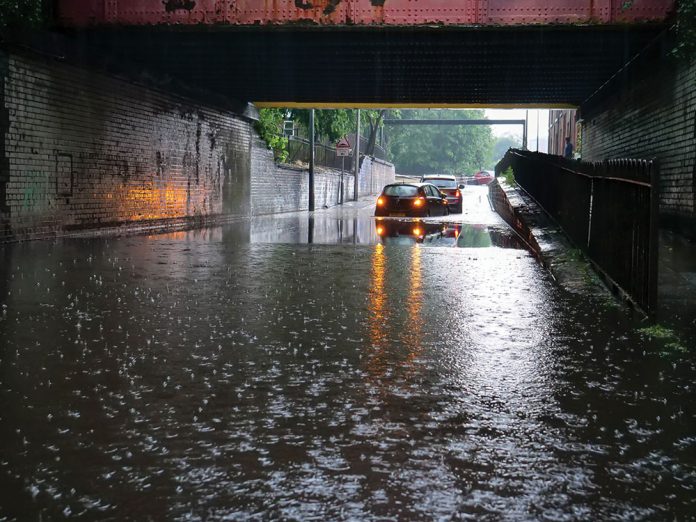January saw three significant storms hit the UK, with road closures, rail interruptions and widespread flooding dominating headlines. Terry Wilkinson, Specialist Design and Application Engineer at ACO Technologies, discusses the impact of storms and how surface water management must evolve to be safe and sustainable while reducing the carbon cost of water treatment.
It has been made very clear that a pressing environmental challenge looms regarding surface water management. The three storms meant more than 600 combined storm warnings were issued in just over three weeks. With storms and floods becoming more frequent and extreme in the UK and correlated treatment of floodwater adding to the country’s carbon emissions, we must ask ourselves why we seem unprepared to deal with the consequences?
What is clear is that conventional approaches to flood mitigation are proving inadequate for the more prevalent extreme weather events we now experience, resulting in increased flood damage, water contamination, and ecological harm.
With the implementation of Schedule 3 of the Floods and Water Management Act 2010 on the horizon, the water industry needs to assess current processes around surface water management and see what can be changed to prevent further damage. The principles of Sustainable Drainage Systems (SuDS) offer solutions that address the four pillars of water quantity and quality, amenity and biodiversity which engineers must consider.
By properly managing surface water with SuDS, we can ensure that it is contained safely, made clean and released in a controlled manner back into nature. With the proper application of SuDS, which utilise water as a precious resource rather than a threat, drainage projects can also contribute to a greener planet by significantly reducing carbon emissions, too. Having SuDS included in a drainage project will help ensure the project complies with Schedule 3. Not only this, but in some applications SuDS can potentially contribute to the ready availability of water – something that the UK should not take for granted as water shortages are predicted to impact large parts of the country in the next few years.
SuDS and supply
It has been reported that seven regions in the UK will likely face severe water stress by 2030. Water stress occurs when demand exceeds available supply and is often linked to population growth and climate change. The looming threat means we need to find ways to facilitate the eco-friendly capture and cleaning of water wherever possible.
SuDS solutions mimic natural water movements, so, by making them part of the UK water system, it is possible to reduce the risk of surface water flooding, pollution and help alleviate the pressures on our traditional drainage and sewerage systems.
Due to urbanisation, climate change and an increasing population, the UK’s sewerage systems are often at maximum capacity in relatively normal rainfall incidences which is why legislation such as Schedule 3 is needed. When major storms hit, such as Storms Henk, Isha and Jocelyn, that capacity is quickly exceeded.
The difficulties caused by storms are becoming more significant; however, this fact is not a recent development. Storms have long caused problems for traditional sewage systems which rely heavily on centralised networks transporting and treating wastewater from homes, businesses, and infrastructure.
Time for change
It takes an enormous amount of energy for traditional sewer systems to work effectively to handle and treat surface water runoff (pumping, aeration, chemical treatment, and solid waste handling). This has a large impact on the carbon footprint of treatment works. With an increased uptake of SuDS, the load on treatment works, and thus the carbon impact, can be significantly reduced.
The adoption of SuDS is gaining traction, motivated by the twin concerns of environmentalism and the anticipated arrival of Schedule 3. As civil and highways engineers increasingly try to reintegrate natural elements into infrastructure, understanding the environmental footprint is crucial. While perspectives on the deployment of SuDS may vary, their role in climate resilience and biodiversity enhancement is undeniable.
Shifting towards sustainability
Conventional surface water management systems fall short in handling the challenges involved in continuing urbanisation and climate change. In contrast, SuDS present an ecologically responsible solution.
As a water management specialist, we create surface water solutions that naturally care for water using a combination of techniques to capture, contain and clean surface water before allowing its safe release. We also educate our customers on how to make sure drainage systems are designed to protect our water and the wider ecosystem while complying with all relevant regulations.
Professionals in the water industry can partner with SuDS experts, such as ACO, to navigate this complicated and dynamic issue, including changes necessitated by Schedule 3. Striking a balance between the benefits of SuDS – such as flood risk reduction and improved water quality – and the logistics of their implementation is an essential task if we as an industry are to supply clean and reliable water in a safe and sustainable manner.




